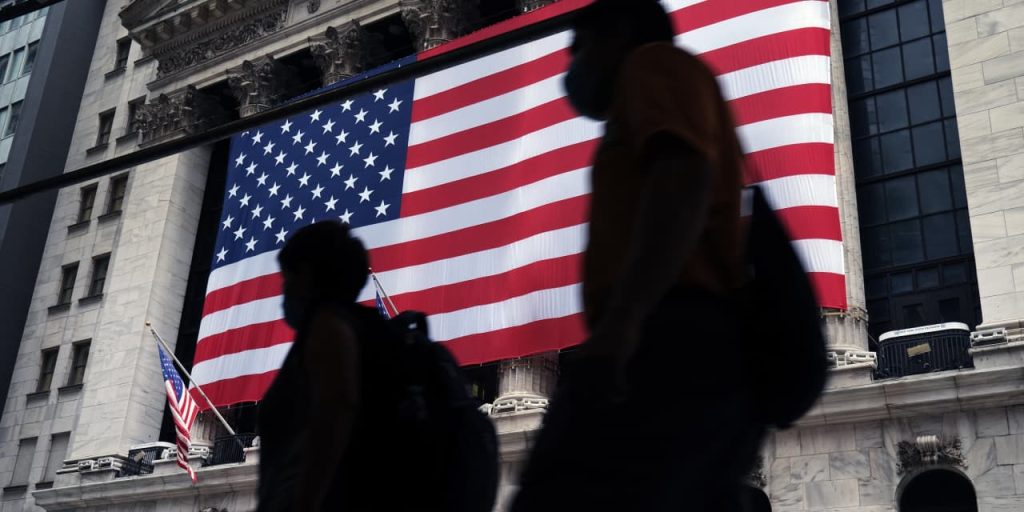The number of companies mentioning recession on their quarterly earnings calls is falling, as stocks extend a big, three-week rally and investors weigh chances for a soft-landing for the U.S. economy.
Eleven percent of companies in the S&P 500 index cited “recession” during their conference calls on earnings results for the third quarter, well below peaks last year and in 2020 that were each more than 40%, according to a DataTrek Research note emailed Monday, citing FactSet data.
Still, company-management worries over an imminent economic downturn remain elevated when looking out over the past decade, said Nicholas Colas, co-founder of DataTrek, in the note. He said mentions of recession during third-quarter-earnings calls remained “at the upper end of the 2013 – 2019 band” where 3% – 11% of companies cited the word.
“Stocks have shrugged off recession fears, but they remain elevated at many companies,” said Colas. “This is a recipe for further cost cutting, and we expect unemployment to increase in coming months as a result.”
At the sector level, the financials and industrials sectors have the highest number of S&P 500 companies citing “recession” on third-quarter earnings calls, while real estate has the highest percentage of companies doing so, according to a note from John Butters, FactSet’s senior earnings analyst, on Nov. 17.
Meanwhile, the Conference Board’s leading economic index has continued to flash recession signs even as the U.S. economy has kept growing amid a low unemployment rate. Investors have been keeping a close eye on inflation, which has eased this year after surging in 2022 to the highest level in decades, but remains above the Federal Reserve’s 2% target.
Soft-landing hopes
The Fed has rapidly raised interest rates in an effort to tame inflation while at the same time trying to engineer a so-called soft landing for the U.S. economy. That is, the central bank has been aiming to avoid triggering a recession with its series of rate hikes begun in early 2022.
With inflation easing, the Fed has held its benchmark rate steady since it last lifted it to a 22-year high in July.
“The problem: Inflation is falling because rapid rate rises to combat it have pushed U.S. growth trend below pre-Covid levels,” BlackRock Investment Institute wrote in a market-commentary note Monday. “We think more of the same is needed to keep inflation down as price pressures resume amid slowing labor force growth and geopolitical shocks.”
According to BlackRock, “markets appear to miss this bigger picture, and we see more volatility ahead as they swing between hopes for a ‘soft landing’ and fears about higher rates and recession.”
More than half of S&P 500 companies “still see inflation pressures in their cost structures and are calling this to the attention of Wall Street analysts and investors,” said DataTrek’s Colas, pointing to data from FactSet on mentions of “inflation” during their earnings calls for the third quarter.
While the percentage of S&P 500 companies citing “inflation” fell to 55%, from a 2022 peak of 83%, that is “still well above prepandemic era readings” in the range of 18% to 32%, Colas said of their earnings calls.
“Corporate America’s ongoing unease about important macroeconomic trends” based on mentions of “recession” and “inflation” on earnings calls isn’t “necessarily bad” for stocks, according to the DataTrek note.
“Managements know the name of the game next year will be margin management, not mindlessly maximizing revenues,” Colas wrote. “As long as the U.S. economy continues to grow into next year, this should allow companies to meet or beat Wall Street analysts’ earnings estimates over the next 2 quarters.”
U.S. stocks were rising on Monday afternoon, with the Dow Jones Industrial Average
DJIA
up 0.5% while the S&P 500
SPX
gained 0.7% and the Nasdaq Composite
COMP
climbed 1%, according to FactSet data, at last check.
The S&P 500 was on track to extend its big winning streak, after jumping 9.6% over the past three weeks in its largest three-week percentage gain since June 2020, according to Dow Jones Market Data. The index has risen more than 18% so far this year, based on Monday afternoon trading.
Read: Stock market surges toward 2023 high. Will holiday shoppers put it over the top?
Read the full article here



